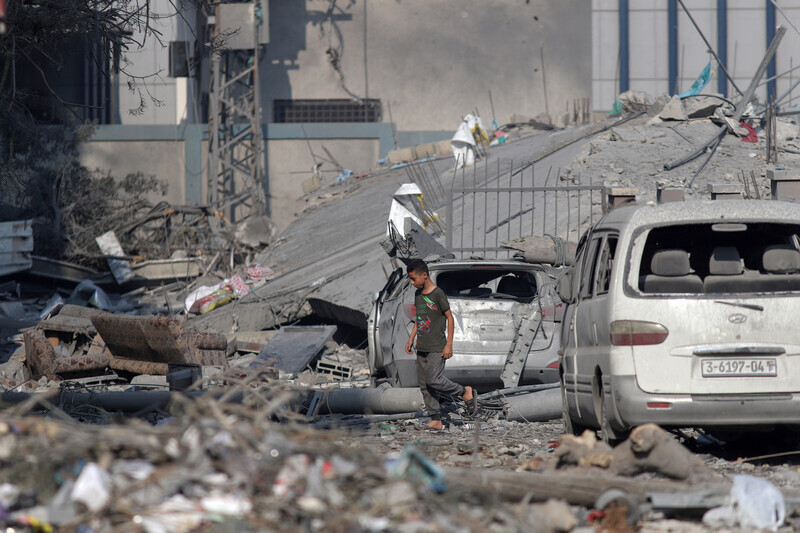hankyoreh
Links to other country sites 다른 나라 사이트 링크
War in Middle East blows a hole in Biden’s strategy of checking China, say Korean experts

Analysts say the US will find it difficult to maintain its strategy in the Indo-Pacific aimed at containing China now that Israel and Hamas are at war on top of the ongoing confrontation between Russia and Ukraine.
During an emergency public conference on the subject of Middle Eastern affairs in relation to hostilities in Palestine held in-person and virtually at Korea National Diplomatic Academy (KNDA) on Thursday morning, In Nam-sik, the head of strategic region studies at the institution, remarked, “The conflict between Israel and Palestine that has been chronic in the Middle East erupted into a war at a time when weariness is growing in the European front,” adding that “whether the US will maintain its Indo-Pacific strategy focusing on putting pressure on China in the region should be closely observed.”
He continued, “Although the US expressed its support of Israel and even sent a carrier strike group, it is probably caught off guard,” as having to invest resources into the Middle East “has blown a hole in Biden’s plan to create a stable foothold outside the [Indo-Pacific] region for his Indo-Pacific strategy intended to rein in China.”
Experts were divided on whether Israeli ground forces would make their way to the Gaza Strip and engage in all-out war. In said he was skeptical that such a scenario would become a reality. In contrast, Choi Woo-seon, the head of international security and unification studies at the KDNA, said a large-scale ground operation is likely, explaining, “Strong retaliation based on the belief that sitting idly after an attack of such intensity akin to warfare would lead to provocations is highly probable.”
Others estimated that civilian casualties that would arise in the process of Israeli attacks against Hamas would factor as a burden. Sogang University political science professor Lee Geun-wook commented, “When Israel and Palestine fight, the latter incurs 10 times the casualty than the former,” adding, “This will be the case once again, and there will be many civilian victims, which will divide public opinion, erasing the fact that Hamas struck first and increasing Israel’s liability.”
Regarding economic risks brought about by recent events, In stated, “While uncertainty, a risk factor in investments, will arise, the price of oil doesn’t seem to have been impacted significantly yet.”
Meanwhile, regarding predictions that countries of the West, disappointed by Saudi Arabia’s declaration of support for Palestine, may support South Korea in the election to select the host of the World Expo 2030 slated to take place in roughly 50 days, In projected that the recent clash will not bring a sea change in the campaign to host the world’s fair.
By Shin Hyeong-cheol, staff reporter
Please direct questions or comments to [english@hani.co.kr]

Editorial・opinion
![[Editorial] Intensifying US-China rivalry means Seoul must address uncertainty with Beijing sooner than later [Editorial] Intensifying US-China rivalry means Seoul must address uncertainty with Beijing sooner than later](https://flexible.img.hani.co.kr/flexible/normal/500/300/imgdb/original/2024/0517/8117159322045222.jpg) [Editorial] Intensifying US-China rivalry means Seoul must address uncertainty with Beijing sooner than later
[Editorial] Intensifying US-China rivalry means Seoul must address uncertainty with Beijing sooner than later![[Column] When ‘fairness’ means hate and violence [Column] When ‘fairness’ means hate and violence](https://flexible.img.hani.co.kr/flexible/normal/500/300/imgdb/original/2024/0516/7417158465908824.jpg) [Column] When ‘fairness’ means hate and violence
[Column] When ‘fairness’ means hate and violence- [Editorial] Yoon must stop abusing authority to shield himself from investigation
- [Column] US troop withdrawal from Korea could be the Acheson Line all over
- [Column] How to win back readers who’ve turned to YouTube for news
- [Column] Welcome to the president’s pity party
- [Editorial] Korea must respond firmly to Japan’s attempt to usurp Line
- [Editorial] Transfers of prosecutors investigating Korea’s first lady send chilling message
- [Column] Will Seoul’s ties with Moscow really recover on their own?
- [Column] Samsung’s ‘lost decade’ and Lee Jae-yong’s mismatched chopsticks
Most viewed articles
- 1For new generation of Chinese artists, discontent is disobedience
- 2[Editorial] Transfers of prosecutors investigating Korea’s first lady send chilling message
- 3[Exclusive] Unearthed memo suggests Gwangju Uprising missing may have been cremated
- 4[Editorial] Intensifying US-China rivalry means Seoul must address uncertainty with Beijing sooner t
- 5S. Korea “monitoring developments” after report of secret Chinese police station in Seoul
- 6N. Korean media upgrades epithet for leader’s daughter from “beloved” to “respected”
- 7Yoon says concern about biased diplomacy is being incited by “communist totalitarian forces”
- 8[Column] US troop withdrawal from Korea could be the Acheson Line all over
- 9Xi, Putin ‘oppose acts of military intimidation’ against N. Korea by US in joint statement
- 1060% of young Koreans see no need to have kids after marriage